Ata-ul-Haye Nasir, Ahmadiyya Archive & Research Centre
Hazrat Mirza Bashiruddin Mahmud Ahmad, Khalifatul Masih IIra gave valuable guidance – which was highly applauded by intellectual circles – to the newly formed Pakistan and advised the public and the government to understand their responsibilities for the successful future of Pakistan.
In December 1947, Hazrat Musleh-e-Maudra started a series of six lectures, titled Pakistan Aur Uska Mustaqbil (Pakistan and its future), which were delivered in Lahore. The lectures on Pakistan’s future concluded on 17 January 1948.
The first five lectures were delivered at the Maynard Hall of the Law College Lahore, with the sixth one at the University Hall.
These talks were highly applauded by lectures and academic circles and many newspapers published news articles about these lectures, including Nawaiwaqt, Nizam, Zamindar, Safina, The Eastern Times and Taqat.
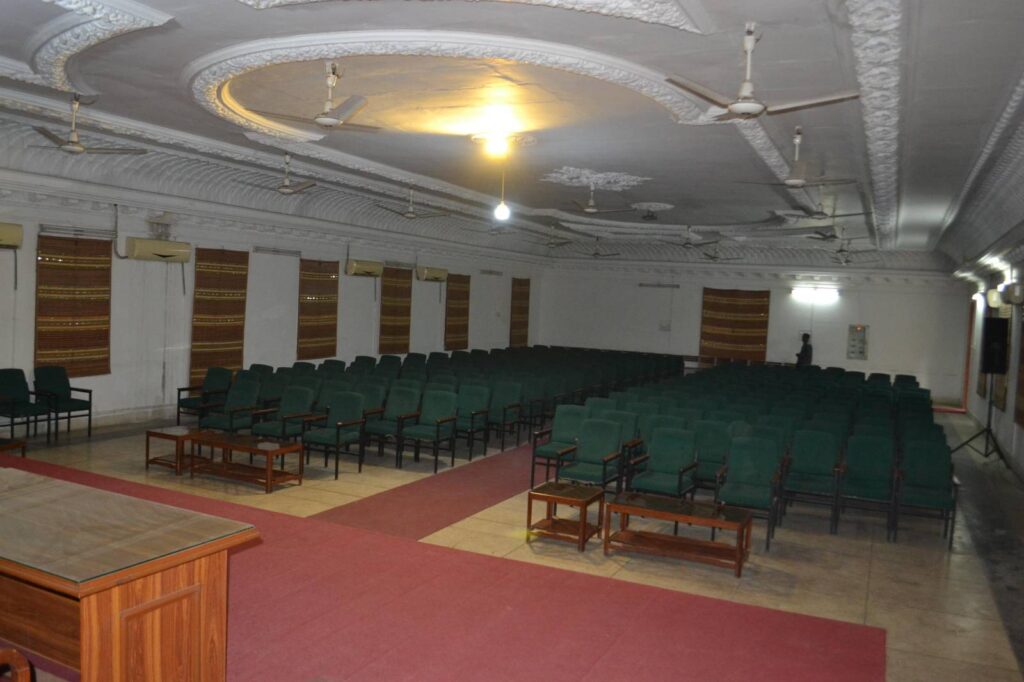
Pakistan’s defence, agriculture and industry
The first lecture was delivered on 1 December 1947, and the session was presided over by Justice Muhammad Munir, former Chief Justice of Pakistan. The hall was filled to the brim and included many intellectual personalities.
Huzoorra spoke about Pakistan’s future with respect to its defence, agriculture and industry. He stated that Pakistan needed to pay special attention towards its defence as its borderlines were very long, and the heavily populated cities of Pakistan were located adjacent to the borders. (Al Fazl, 2 December 1947, p. 1)
After the lecture, Malik Abdul Qayyum, Principal of the Law College Lahore, wrote to Huzoorra, saying:
“I listened with great interest and profit to your lecture on Pakistan yesterday. It was full of new knowledge and breathed spirit of courage and hope. I am sure, my fellow-listeners must have come away from it with the same feeling. It was not merely a lecture, it was a timely warning to those who were accustomed to look at things from an entirely different angle.” (Tarikh-e-Ahmadiyyat, Vol. 10, p. 408)
The Eastern Times of Lahore, while reporting about Huzoor’s lecture, stated:
“The greatest need, he said, was of inculcating a strong spirit of organization and discipline among all section of the population.
“He strongly upheld the view that the agriculture of the country should be developed. There was ample scope for this in Pakistan […]
“Pakistan was rich in mineral resources like coal, lead, petroleum, mica, etc., but all these resources were in an undeveloped form. A complete survey was the supreme need of the time […]
“The speaker suggested the establishment of a Pakistan National Laboratory for carrying out researches in the domain of commercial industry, agriculture and defence. There was no such laboratory in the whole of Pakistan at present.
“The lecture continued for more than two hours and was the first of the series of lectures on the ‘Future of Pakistan’.” (The Eastern Times, 3 December 1947)
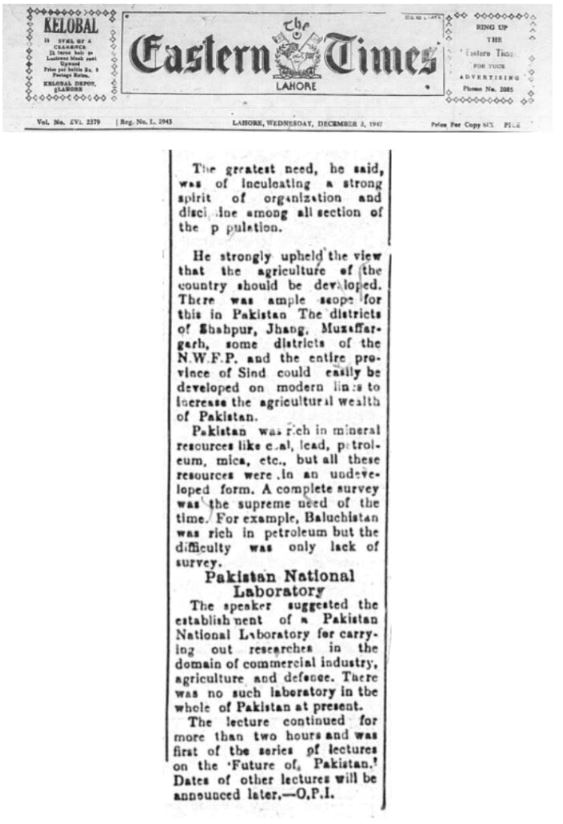
Ganda Singh has mentioned this lecture in his diary and stated:
“Mirza Bashir-ud-din, head of the Ahmadiya Community, in a meeting at Law College, Lahore, strongly opposed the reported proposal of the Pakistan Government for a loan of six million dollars from U.S.A.” (A Diary of the Partition Days: 1947, Ganda Singh, Journal of Indian History, 1960, p. 273)
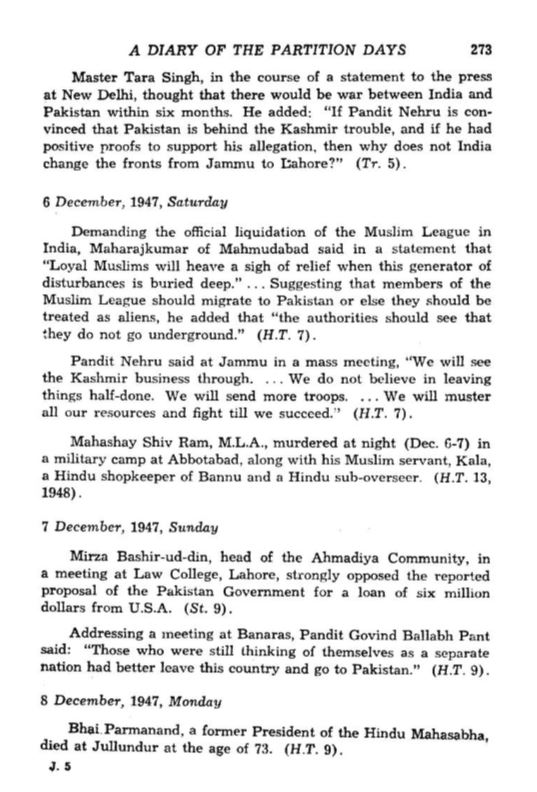
Nawa-i-waqt reported:
“While giving analysis on the agricultural position of Pakistan, Mirza Bashiruddin emphasised to immediately cultivate the unused lands. He said that apart from iron, Pakistan has all those minerals from which Pakistan can fulfil its needs very well. If efforts are made, then oil can be found in Balochistan in such an amount that will beat even Ibadan [a city of Nigeria where oil had been found in abundance]. Similarly, if the quest and search for coal is continued, Pakistan could become self-sufficient for all of its needs.” (Nawa-i-waqt, 4 December 1947, p. 5)
Nizam of Lahore stated:
“[…] Hazrat Mirza Bashiruddin Mahmud Sahib spoke about Pakistan’s prosperity as well. He said that coal, petrol and other metals are present [in Pakistan] in huge amounts, but they are yet to be found. Thus, full attention is required immediately. For instance, Balochistan has a great reservoir of oil, but no benefit has yet been attained. The respected speaker emphasised the need to open Pakistan’s national laboratory and to enhance Pakistan’s industrial production.” (Nizam, 4 December 1947)
An Indian newspaper, Veer Bharat of Amritsar, stated:
“The Khalifa of the Ahmadis, Mirza Bashiruddin Mahmud Ahmad has raised his voice against the loan of six billion dollars which Pakistan intends to get from America. Mirza Sahib thinks that it will make Pakistan a slave of America, economically and politically.” (Veer Bharat, 13 December 1947)
Pakistan’s botanical, agricultural and zoological resources
The second lecture was delivered on 7 December 1947 and the session was presided over by Sir Feroz Khan Noon, former Prime Minister of Pakistan.
In this lecture, Huzoorra spoke on Pakistan’s future with respect to its botanical, agricultural and zoological resources.
Huzoorra stated:
“The presence of firewood and teakwood is immensely necessary for the protection and progress of a country. Firewood can also serve as the replacement for coal. In the past, reserve forests of firewood were planted around the big cities, from where the wood was supplied to the cities.
“And the landowners of the towns were made responsible to plant trees, and were not permitted to cut the small trees, to avoid wastage of wood. In every village, trees were planted in so many numbers that could fulfil a village’s needs for firewood and teakwood.
“There was not that much attention towards the rural economy and livelihood during British rule, as they belong to an industrial country, and thus the cities attracted the most attention. For this reason, the old system could not continue, and due to the deforestation, the villages were deprived of trees.” (Al Fazl, 9 December 1947, p. 6)
Huzoorra said that it was a duty of the government of Pakistan to make such arrangements that could provide firewood to the villages and towns. Huzoorra suggested that the government should create units of five or six villages, and establish a panchayat (administrative and arbitration council) which would be responsible for the economic and health facilities. For the villages of a unit, a specific place should be fixed to plant firewood and teakwood trees, and the panchayat should supervise this task.
Huzoorra stated that as a result, the need for firewood would be fulfilled and the dung which villagers used as a replacement of firewood, could be used as a fertiliser or compost. Thus, it would eventually benefit the agriculture of the country.
Huzoorra further advised that reserve forests of firewood should be created under the supervision of district boards in the surroundings of towns that had more than a 10,000 population.
Huzoorra added that the provincial governments should be given the responsibility of planting the reserve forests for firewood in the surroundings of the cities with more than 50,000 population.
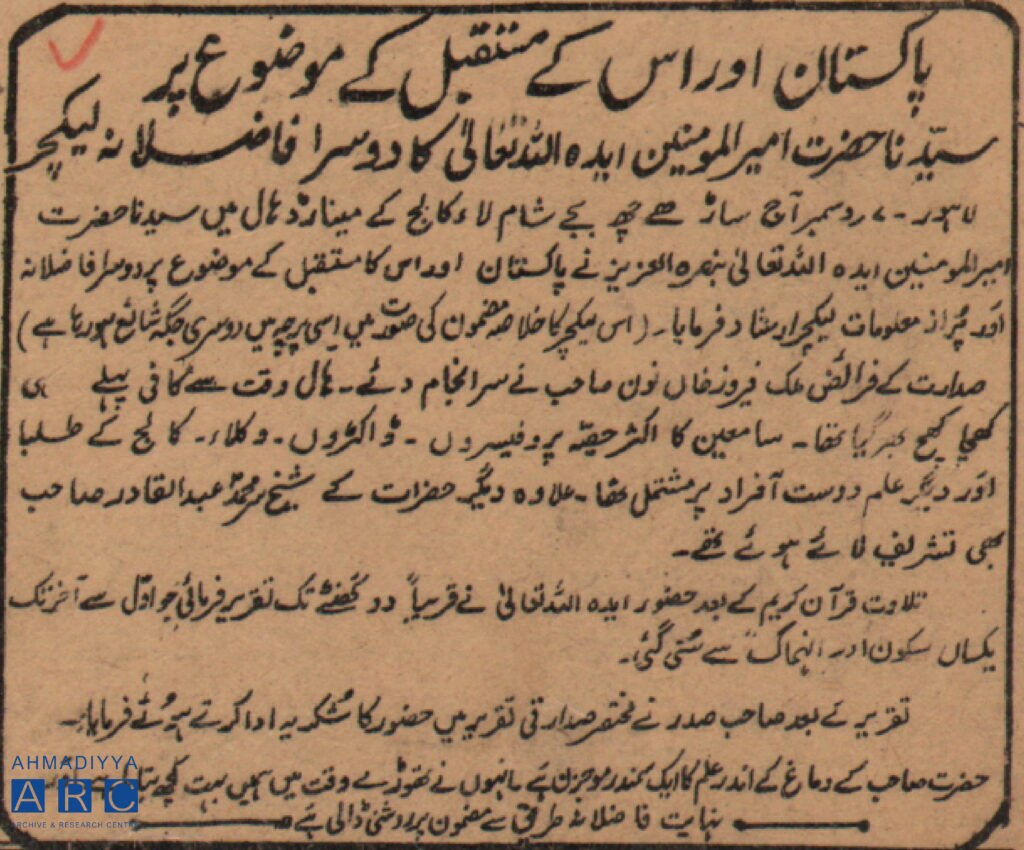
Then Huzoorra spoke about Pakistan’s botanical resources. He said:
“Herbs are a huge part of botanical resources. The best herbs are found in Kashmir, Chamba, Chitral, NWFP [now Khyber Pakhtunkhwa] and Balochistan. Kashmir’s issue is controversial, and Chamba has definitely been affiliated to the Indian Union. Thus, in Pakistan, herbs can be taken from Chitral, NWFP and Balochistan, and it is the fortune of Pakistan that many [kinds of] herbs can be found in these three areas. Some of the herbs are so rare that they are not found in some other parts of the world. The speciality of the herbs found in Balochistan, is that in comparison to the [herbs of] other areas, they have more amount of alkaloids – which is a key element of medicines.” (Al Fazl, 9 December 1947, p. 7)
Huzoorra continued:
“Pakistan is an independent country now, and it has an opportunity to get the maximum benefit from its botanical resources. If a department is established to discover the alkaloids and other chemical ingredients, then scores of medicines could be invented in Pakistan, which could be sold at good prices in the global market.” (Ibid)
After this lecture, Mirza Masud Baig Sahib, former General Secretary of the Lahore Ahmadiyya Movement, wrote to Huzoorra on 8 December 1947:
“You have delivered two lectures at the Maynard Hall, which have had a great impact on the people of Lahore. May God enable the people in authority to benefit from your invaluable suggestions and advice for eradicating the problems of this country and nation […] It is my prayer that the Muslims may benefit from your honourable being.” (Tarikh-e-Ahmadiyyat, Vol. 10, pp. 408-409)
In appreciation of this lecture, Sir Feroz Khan Noon, former Prime Minister of Pakistan, expressed:
“There is an ocean of knowledge billowing in Hazrat Sahib’s mind. He has told us a lot in such a short time and shed light on the matter in a scholarly way.” (Al Fazl, 9 December 1947, p. 1)
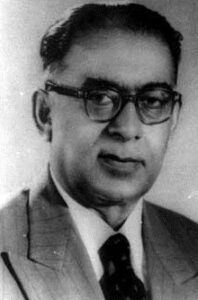
The newspaper Zamindar reported:
“Last evening, while speaking on Pakistan and its future to a huge gathering at the Maynard Hall of Law College, Mirza Bashiruddin Mahmud Ahmad, Imam Jamaat-e-Ahmadiyya delivered an insightful and comprehensive lecture on Pakistan’s agriculture, economy and finance. Malik Feroz Khan Noon presided over this gathering.
“While mentioning the irrigation for agriculture, especially canals, Mirza Sahib said that due to the damages to the canals over the last 50 years, Pakistan’s agriculture is in big danger. There is a need for huge expenditure and money for eradicating this danger by working in accordance with scientific methods. Under the current circumstances, our government cannot afford this [expenditure]. But taking a loan from the foreign states, especially America, would prove to be a very big danger for our freedom.
“Therefore, the only remedy is to grant a conditional permit to foreign companies for investment in Pakistan. 40 percent of shares should be given to those firms, 40 percent should be held by the government and the remaining 20 percent shares should be owned by the public of Pakistan. In this regard, there should be a condition for the firms that they will also train our share-holders.” (Zamindar, 10 December 1947)
Pakistan’s ma‘nawi (moral and spiritual) wealth
On 13 December 1947, Huzoorra delivered the third lecture of this series, at the Maynard Hall of the Law College Lahore. The session was presided over by Dr Malik Umar Hayat, Principal Islamia College Lahore and Vice Chancellor Punjab University. The hall was filled to its capacity and the attendees included highly qualified intellectuals and academics of Lahore.
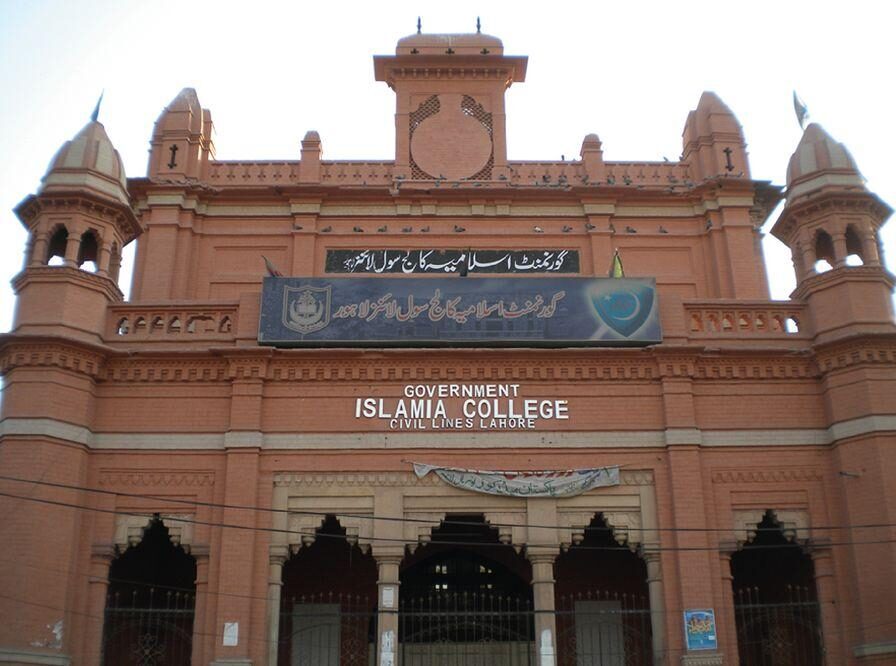
In this lecture, Huzoorra spoke about the future of Pakistan with respect to the ma‘nawi (moral and spiritual) wealth.
At the beginning of his lecture, Huzoorra said that he had come to know that Pakistan was considering taking a loan from America. Huzoorra said:
“In my view, it is necessary to ponder on various important aspects before implementing this suggestion.” (Al Fazl, 14 December 1947, p. 1)
After elaborating on those crucial considerations, Huzoorra emphasised that before any further action, the government should seek the approval from the national assembly.
Huzoorra then spoke about the main topic of the lecture, and stated:
“The ma‘nawi [moral and spiritual] wealth is the real power of a country. Everything else has a secondary status. If every youngster of Pakistan can be heedful and thoughtful, and pledge that ‘I will dedicate all of my powers for the sake of country and nation’, then certainly all of our needs can be fulfilled, and we can defend the country in such a positive way that even cannons and aircraft have no status in comparison.” (Al Fazl, 14 December 1947, p. 1)
Huzoorra continued by saying that moral and spiritual wealth were produced by the mutual efforts of a person’s mind and body, and for this, Pakistan had suitable resources.
Huzoorra elaborated that mentally, a Muslim is impressed by four things: Belief in tawhid (Oneness of God), belief in ubudiyyat (servitude of God), dua (prayer) and religion.
After describing the details of these four areas, Huzoorra said:
“If the Muslims instil within themselves complete belief in these four matters, and bring a [spiritual] change accordingly, then, as a result, they can inculcate within themselves all the [necessary] attributes for progress, such as courage, bravery and interest for advancement in knowledge.” (Al Fazl, 14 December 1947, p. 1)
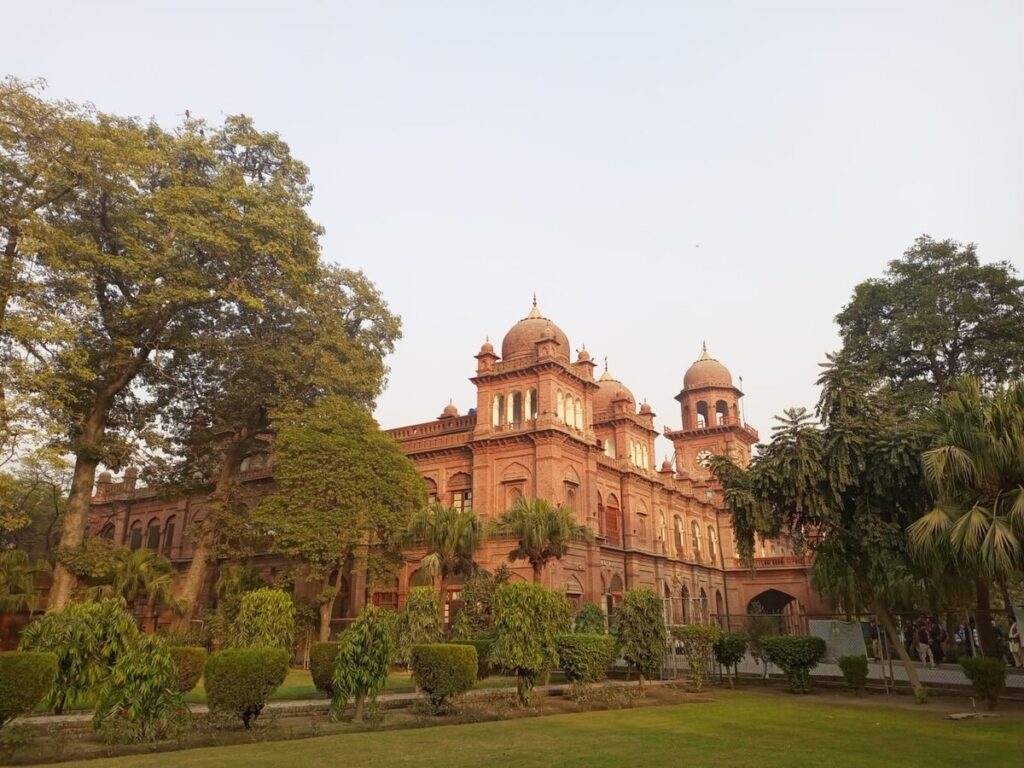
For benefiting the ma‘nawi [moral and spiritual] wealth, Huzoorra suggested:
“1. It should be compulsory for every Pakistani Muslim to learn the translation of the Holy Quran.
“2. Education should be given in the mother tongue [of the student]. The people of Eastern Pakistan [now Bangladesh] should not be forced to get education in Urdu, otherwise they will separate from Pakistan because they have a great love for the Bangla language.
“3. Urdu language should be declared as the lingua franca [common language].” (Ibid)
While advising the youth of Pakistan, Huzoorra stated:
“They should instil good morals, make a habit of deliberating, value time and make it beneficial for the country and nation as much as possible, create affinity between the rich and poor and try to excel [the country] economically.” (Al Fazl, 14 December 1947, pp. 1-2)
After Huzoor’s lecture, the chairperson, Dr Malik Umar Hayat said in his speech:
“Hazrat Mirza Sahib’s speech was so knowledgeable and comprehensive that we listened to it with great interest from start to end.” (Al Fazl, 14 December 1947, p. 2)
Pakistan’s Armed forces
On 20 December 1947, Huzoorra delivered the fourth lecture of this series, and the session was presided over by Mian Fazl Hussain.
In this lecture, Huzoorra spoke about the future of Pakistan with respect to its armed forces.
At the beginning, Huzoorra presented an overview of Pakistan’s defence power, and then pointed out some noteworthy aspects.
While speaking about the air force, Huzoorra advised to bring the public’s attention towards aerial training and to make such arrangements in universities and colleges.
Huzoorra elaborated that in the time of need, aircraft could be bought even in one day, but the pilots could not be trained in such a short time. Thus, Huzoorra stated, special attention should be paid towards this matter.
After Huzoor’s lecture, the chairperson, Mian Fazl Hussain delivered the concluding remarks and advised the attendees to act on the valuable suggestions presented by Huzoorra.
Pakistan and international relations
On 10 January 1948, Huzoorra delivered the fifth lecture and the session was presided over by Sheikh Sir Abdul Qadir, a prominent jurist and journalist.
In this lecture, Huzoorra advised the government of Pakistan to strengthen its defence. Moreover, Huzoorra stated that the government should also make good relations with India, but in a respectable way instead of compromising the country’s dignity.
Huzoorra also emphasised the need for making good relations with Britain and America, but cautioned Pakistan to be aware of any deceit. Huzoorra stated that Pakistan needed to establish peaceful relations with Russia too.
Concerning Arab countries, Huzoorra stated that Pakistan needed to make friendly relations with these countries, and it was necessary to connect Pakistan with Iraq and Syria through a railway line.
Huzoorra added that friendly relations with Burma and Ceylon (now Sri Lanka) would prove critically beneficial for Eastern Pakistan [now Bangladesh]. Moreover, friendly ties with Spain, Argentina, Japan, Australia, Abyssinia and West Africa could also prove politically beneficial for Muslims due to their specific circumstances.
After Huzoor’s lecture, the chairperson, Sheikh Sir Abdul Qadir, said in his concluding speech:
“The basic purpose of these insightful and knowledgeable lectures is to call the attention of our educated people towards pondering upon these topics so that they may know that although we are facing many difficulties, if we try to get rid of these difficulties with perseverance and continue to work, we will certainly achieve our goal. Through these lectures, Hazrat Mirza Sahib has rendered a great service to the learned people. We are thankful to him from our hearts for this.” (Al Fazl, 11 January 1948, p. 8)
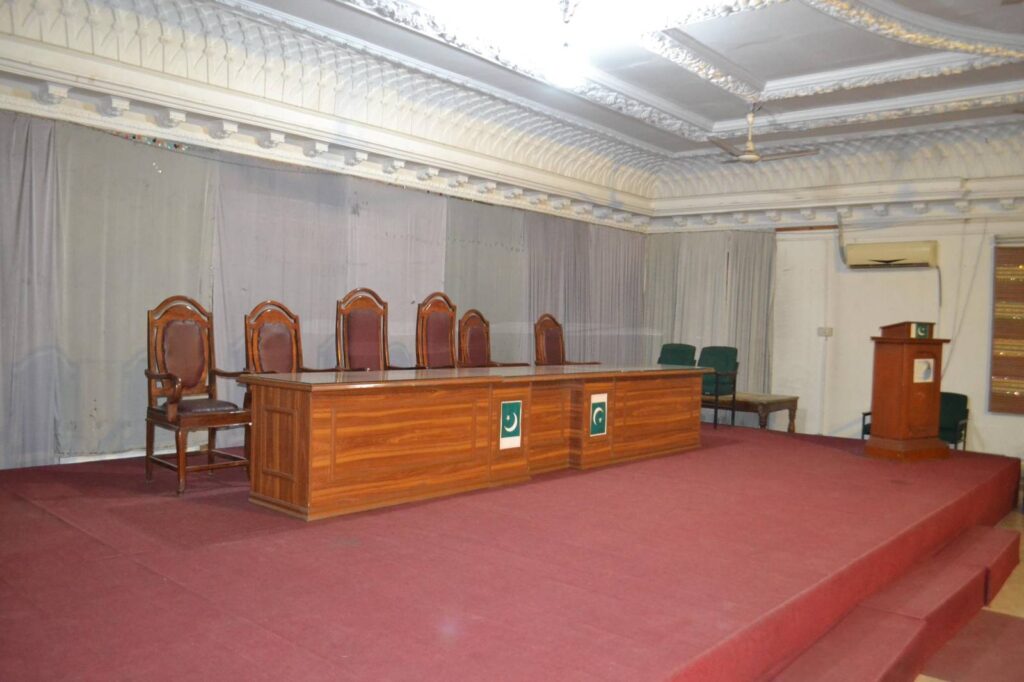
Pakistan’s constitution
On 17 January 1948, Huzoorra delivered the last lecture of this series, and the session was presided over by Sheikh Sir Abdul Qadir.
In this lecture, Huzoorra spoke about the constitution of Pakistan, and outlined some basic points that were necessary to draft a suitable constitution, in light of the teachings of the Holy Quran.
Huzoorra stated:
“Islam has emphasised individual [spiritual and moral] reformation and purification of the heart because no law can ever be successful without the reformation of the heart. If the heart is not purified, then even the ‘best’ law can be used in a bad way […] Remember that if the [Muslim] individuals do not act upon the Islamic commandments which are incumbent upon them, then an Islamic constitution can never be implemented in the country. For an Islamic government, the establishment of an Islamic society is necessary and for an Islamic society, it is necessary to become an Islamic individual.” (Al Fazl, 18 January 1948, p. 1)
While elaborating on the question over how Islamic teachings were compatible in this age, Huzoorra stated:
“There is no Islamic commandment which cannot fulfil the needs of this age. Especially in this era, the excellence of Islamic commandments has been proven again. Divorce, marriage of widows, marrying with close relatives and prohibition of alcohol are matters which have been strongly objected during the last hundred years. But now, the same nations and governments, who raised objections [about these in the past] are adopting these [Islamic] teachings.” (Tarikh-e-Ahmadiyyat, Vol. 10, p. 429)
After Huzoor’s lecture, the chairperson, Sheikh Sir Abdul Qadir thanked Huzoorra on behalf of the audience for the series of lectures and said:
“I request the respected speaker that the public will be very thankful to you if these lectures could be published in book form. One thing that has impacted me a lot is that despite the fact that the learned speaker and his Jamaat have suffered greatly in the past riots, he did not even point towards those incidents. I believe there was great wisdom behind this because it is the thinking of Hazrat Mirza Sahib that whatever happened is part of the past now, and it cannot be changed, so there is no point in debating it. And now, we should only talk about what can be done in the future or what is in our hands.” (Al Fazl, 18 January 1948, p. 2)
If the government and the people of Pakistan had acted on Hazrat Musleh-e-Maud’s valuable and timely guidance – which was hugely praised at the time – the country would have progressed immensely, and it could have avoided many setbacks, which were faced in the following years and in present-day Pakistan.
اِک وقت آئے گا كہ كہیں گے تمام لوگ
ملّت كے اس فدائى پہ رحمت خدا كرے
“The time will come when everyone will say, ‘May God have mercy on this devotee of the nation.’”
Related Content
- Hazrat Musleh-e-Maud’s services to the Muslim cause: Guidance and support to leaders of the Pakistan Movement
- ‘The consolidation of Pakistan’: Lectures by Hazrat Mirza Bashiruddin Mahmud Ahmad on how Pakistan can see success
- Hazrat Musleh-e-Maud’s services to the Muslim cause: Nurturing the newly formed Pakistan
- Sacrifice is the key to nation-building: Hazrat Musleh-e-Maud’s advice to the newly-formed Pakistan
- Promises made to minorities when Pakistan was created must be fulfilled: Hazrat Musleh-e-Maud’s guidance for Pakistani laws


Please, we need more articles like this